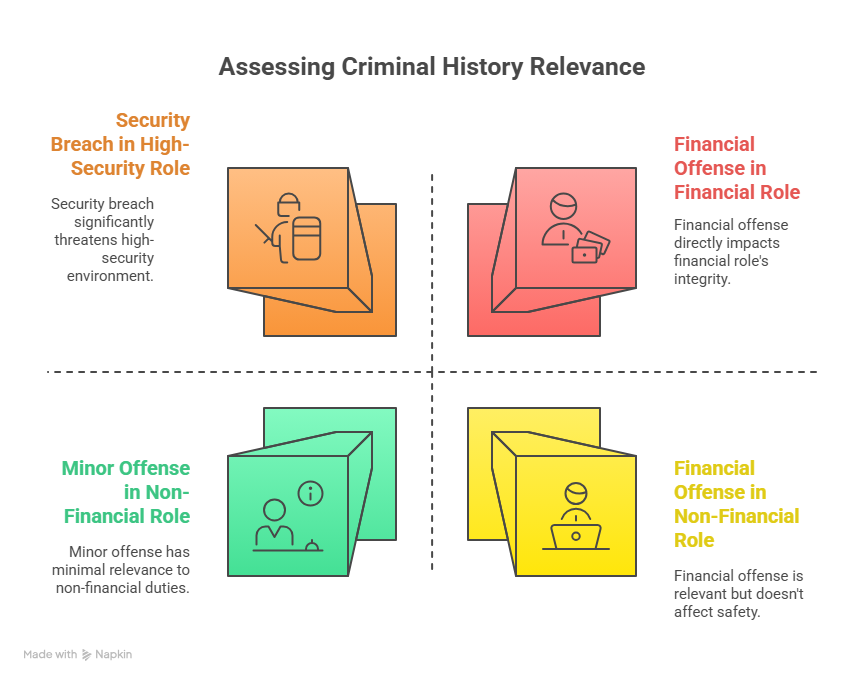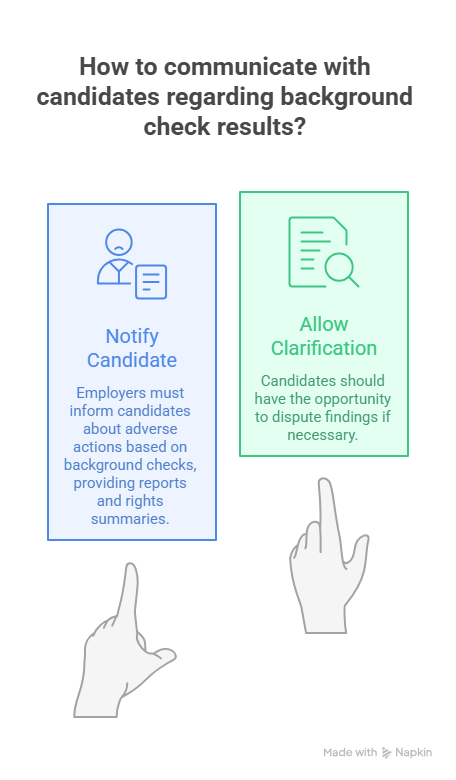The interpretation of criminal background check results is a delicate and nuanced aspect of the hiring process. It requires HR professionals to not only understand the different types of records but also to evaluate them in the context of the job role and the candidate's overall profile.
Differentiating Types of Records
- Understanding Arrest Records vs. Convictions: An arrest record doesn't equal guilt. In contrast, a conviction is a clear indication of guilt. HR should weigh convictions more heavily than arrests, especially considering that relying solely on arrest records can lead to discriminatory practices.
- Reviewing Court Records: Court records provide detailed insights, including the nature of the offense, the verdict, and any sentencing. This comprehensive information can help HR understand the severity and relevance of the offense.
In my practice as a human resource practitioner, I have found that every background check becomes a new narrativeâÂÂone that requires sensitivity, as well as careful judgment about fairness, context, and sensitivity. That act of delving into criminal records becomes, rather than a mere desire to protect the organization, a chance to enable people to move beyond their histories.I have had candidates who, through their records alone, could have been excluded; however, through proper understanding and elucidation, have become some of our best members. We must guarantee accountability, yet also must guarantee a certain amount of compassion, knowing that second chances have the power to change lives and make workplace environments better. Background checks should never end a conversation; instead, they should begin a deeper one.
Assessing Relevance to the Job Role
- Job-Relatedness: It is important to take into account the type of offense committed by a job applicant or employee in relation to the duties and responsibilities of the job. For instance, a financial offense might be more relevant for a position dealing with financial transactions, while it may be less pertinent for a non-financial role.
- Workplace Safety and Integrity: HR must also consider how a candidateâÂÂs criminal history could affect workplace safety and integrity. This is particularly important for positions that involve working with vulnerable populations or in high-security environments.

Considering the Time Factor
- Time Elapsed Since the Offense: The time that has passed since the offense occurred is critical. A recent conviction may be more relevant than one several years ago, as people can change and rehabilitate over time.
- Post-Offense Conduct: When evaluating a candidate, it's important to consider their behavior since the offense occurred. Evidence of rehabilitation, such as further education, steady employment, or community service, can indicate positive personal development.
Legal Compliance and Fairness
- Adhering to EEOC Guidelines: The Equal Employment Opportunity Commission (EEOC) provides guidelines to ensure that criminal background checks do not lead to discrimination. These guidelines recommend considering the nature and gravity of the offense, the time that has passed, and whether the offense is relevant to the job (race, national origin, sex, etc.) (EEOC, 2012; EEOC, n.d.).
- Avoiding Bias: It's important to avoid bias in interpreting the results. Each case must be evaluated based on its unique circumstances, and decisions must be made consistently and non-discriminatorily.
Communicating with Candidates
- Transparency in Adverse Actions: Employers must notify candidates if they decide not to hire them based on their background check results. This is part of the adverse action process under the FCRA, which requires providing a copy of the report and a summary of the candidate's rights.
- Opportunity to Clarify: Candidates deserve a chance to dispute background check findings if needed.

Interpreting criminal background check results requires a fair and legal approach. HR professionals must evaluate relevant records, consider the time elapsed, and ensure compliance with legal guidelines for informed decisions that benefit the organization.
Frequently Asked Questions
How do I determine if a criminal record is relevant to the job position?
Consider the nature of the offense and its relation to the job duties, environment, responsibilities, and potential risk to the organization to determine the relevance of a criminal record.
What should I do if I find a conviction record in a candidate's background?
Assess convictions individually. Consider crime severity, time elapsed, and conduct history. Evaluate job performance and potential risk. Follow EEOC guidelines and avoid discrimination.
How should I handle minor offenses or old convictions?
Minor or old convictions should be weighed less than serious or recent ones. Consider the severity and time passed. If minor or not relevant to the job, or if significant time has passed, it may not be a strong factor in decision-making.
Are there any specific legal guidelines I need to follow when interpreting criminal records?
Adhere to EEOC guidelines and comply with FCRA when considering criminal records in employment decisions. Consider the nature of the crime, time elapsed, and nature of the job. Follow state-specific laws on the use of criminal records.
What if the background check results contain potentially inaccurate or incomplete information?
Give candidates a chance to review and correct any inaccuracies in their background check results. This promotes fairness and helps make informed hiring decisions.
Conclusion
Assessing the criminal history of a person requires something more than going through a mere checklist; a detailed analysis and a subtle understanding of the individual that goes beyond the inscribed data are required. In the context of a human resource, we are often faced with the fine balance between the need to protect our institutions and the need to offer rehabilitative opportunities to such people as deserve them. By adherence to the virtues of fairness, equity, and compassion, we allow individuals to continue without burdening them with the weight of their past. Taking the time to understand the context, rehabilitation, and consequences of a personâÂÂs history helps us craft hiring procedures that are both effective and compliant. Through this patient process, we build teams founded on trust, responsibility, and a common acceptance of the possibility of individual change.
References
U.S. Equal Employment Opportunity Commission. (2012). Enforcement Guidance on the Consideration of Arrest and Conviction Records in Employment Decisions under Title VII of the Civil Rights Act of 1964. https://www.eeoc.gov/laws/guidance/enforcement-guidance-consideration-arrest-and-conviction-records-employment-decisions-employment-decisions
U.S. Equal Employment Opportunity Commission. (n.d.). Background Checks: What Employers Need to Know. Retrieved July 18, 2025, from https://www.eeoc.gov/laws/guidance/background-checks-what-employers-need-know

GCheck Editorial Team
Meet the GCheck Editorial Team, your trusted source for insightful and up-to-date information in the world of employment background checks. Committed to delivering the latest trends, best practices, and industry insights, our team is dedicated to keeping you informed.
With a passion for ensuring accuracy, compliance, and efficiency in background screening, we are your go-to experts in the field. Stay tuned for our comprehensive articles, guides, and analysis, designed to empower businesses and individuals with the knowledge they need to make informed decisions.
At GCheck, we're here to guide you through the complexities of background checks, every step of the way.






